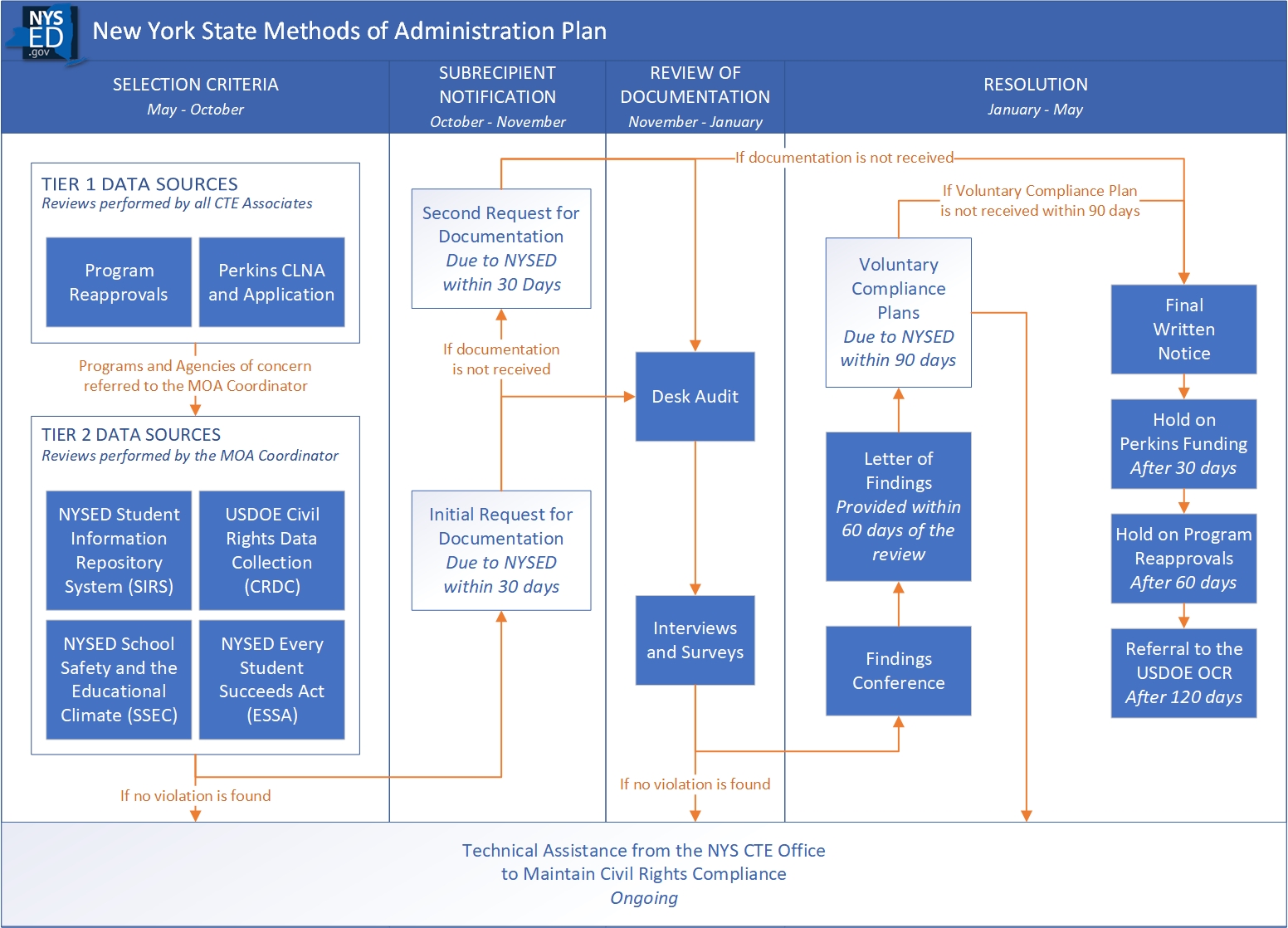Methods of Administration (MOA) Plan
New York State's Methods of Administration and procedures for compliance with the civil rights authorities in career and technical education are carried out by two separate offices overseeing CTE civil rights activities within the New York State Education Department (NYSED). The P-12 Office of Career and Technical Education monitors secondary programs, and the Office of Postsecondary Access, Support and Success monitors postsecondary CTE programs. The plan, approved by the U.S. Department of Education, describes New York’s civil rights monitoring activities covering CTE programs statewide. A summary of the process is found in the chart below.
New York State Methods of Administration Plan
Changes in the Selection Process
The 2020 MOA Plan approved by the Office of Civil Rights, United States Department of Education puts forth a decentralized model that integrates civil rights considerations into the work carried out by all CTE associates at NYSED. Program re-approval reviews have always included implicit equity monitoring. The 2020 MOA plan applies a more explicit and consistent check of outcome data, program design, and enrollment to identify programs that may be out of compliance with civil rights requirements. The MOA plan builds on existing program review procedures to widen our view of issues concerning access to CTE. The plan connects civil rights monitoring to the other oversight work so that CTE associates integrate civil rights considerations as they carry out program and grant reviews. CTE associates will identify activities that signal possible noncompliance to inform decisions about which subrecipients require a comprehensive civil rights review and monitoring and which may require targeted technical assistance. All NYSED CTE staff will take collective responsibility to support equity and access in CTE programs under their purview.
Data Sources
Perkins application, CLNA, program re-approval, school report card, SIRS (data warehouse) reports, ESSA reports, IDEA data, civil rights complaints filed with the Office of Civil Rights, DASA, SSEC.
New Consequences for Non-Compliance
Subrecipients that are out of compliance with civil rights law but are in good standing with the timely completion of activities in the civil rights process as defined in the civil rights guidance on the NYSED’s web page are not subject to sanctions. If noncompliance issues remain unresolved when the subsequent year’s Perkins application is being developed, the violation(s) must be addressed in the Perkins application with associated funded action steps and budgets submitted.
Subrecipients failing to submit a compliance plan within 90 days of receiving a letter of finding will be sent a final written notice about their failure to submit a compliance plan that details the corrective actions to be taken to remedy violations identified in the letter of findings.
State actions shall be taken if a subrecipient is out of compliance with the civil rights process, including failure to submit required documentation per the guidelines published on the NYSED CTE civil rights web page or failure to submit evidence per the agreed-upon actions in the voluntary compliance plan.
Sanctions Policy
All applicants for grants, loans and contracts; property; discounts; other federal financial assistance from the United States Department of Education; or funds made available through the United States Department of Education are required to submit an assurance of compliance with laws and regulations related to Title VI of the Civil Rights Act of 1964; Title IX of the Education Amendments of 1972; Section 504 of the Rehabilitation Act of 1973; the Age Discrimination Act of 1975; and the Boy Scouts of America Equal Access Act of 2001. By signing the assurance, the applicant acknowledges that compliance with the assurance constitutes a condition of continued receipt of federal financial assistance from or funds made available through the United States Department of Education. In the event of a failure to comply, the funds may be terminated, and the applicant may be denied the right to receive further assistance or funds.
A subrecipient of federal financial assistance is subject to the requirements of this assurance. Violation findings and required corrective actions in the letter of findings for subrecipients relating to violations of Title VI, Title IX and Section 504 that continue uncorrected per the letter of findings and/or the submitted voluntary compliance plan may result in a district or BOCES being deemed out of compliance with these laws and, therefore, out of compliance with its assurance. Based on this failure to comply, any federal financial assistance it receives from the United States Department of Education could be terminated.
Subrecipient remaining out of compliance with the civil rights process, including failure to submit required documentation requested by the MOA coordinator or failure to submit evidence per the agreed-upon actions in the voluntary compliance plan will be subject to the following sanctions:
- Hold on Perkins funding—Documentation or evidence is missing after 30 days. Perkins funds will be placed on hold for disbursement until the subrecipient is in compliance.
- Hold on career-technical education program approvals and renewals—Documentation or evidence is missing after 60 days. New programming approval and renewals of existing programming shall not occur until the subrecipient complies with civil rights guidelines.
- Referral to the Office of Civil Rights, United States Department of Education—Documentation or evidence is missing after 120 days late. The hold on Perkins funding (1) and career-technical education new program approvals and renewals (2) will remain in effect until the subrecipient is in compliance. In addition, the Office of Civil Rights will be notified regarding the subrecipient’s noncompliance with the civil rights process.






